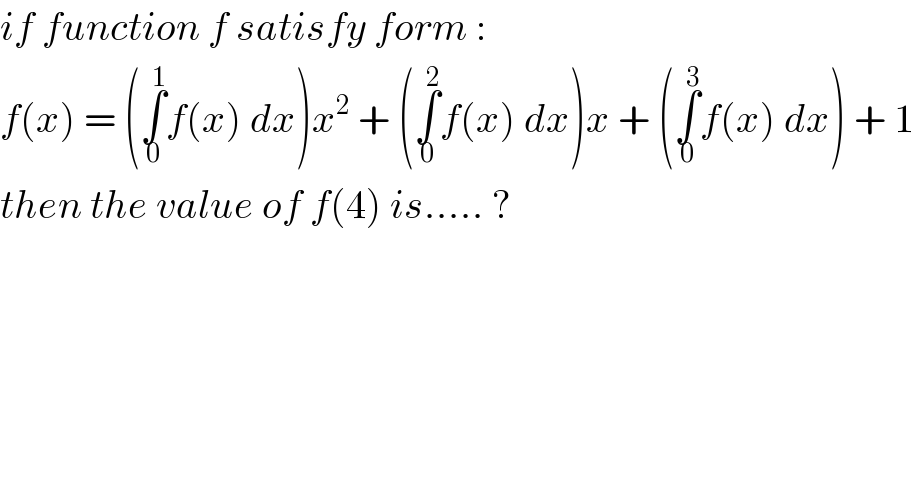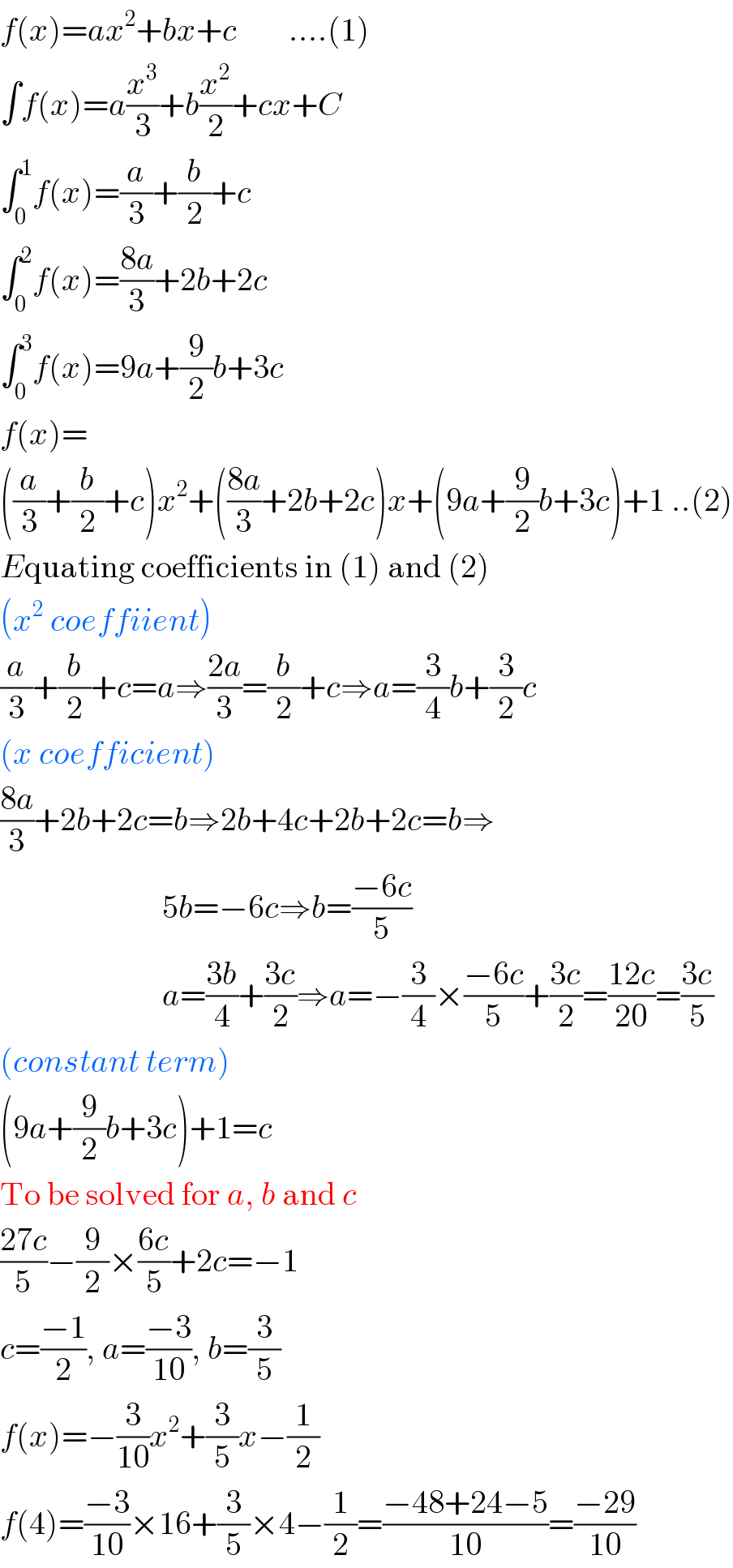
Question Number 2705 by Syaka last updated on 25/Nov/15

$${if}\:{function}\:{f}\:{satisfy}\:{form}\:: \\ $$$${f}\left({x}\right)\:=\:\left(\underset{\mathrm{0}} {\overset{\mathrm{1}} {\int}}{f}\left({x}\right)\:{dx}\right){x}^{\mathrm{2}} \:+\:\left(\underset{\mathrm{0}} {\overset{\mathrm{2}} {\int}}{f}\left({x}\right)\:{dx}\right){x}\:+\:\left(\underset{\mathrm{0}} {\overset{\mathrm{3}} {\int}}{f}\left({x}\right)\:{dx}\right)\:+\:\mathrm{1} \\ $$$${then}\:{the}\:{value}\:{of}\:{f}\left(\mathrm{4}\right)\:{is}.....\:? \\ $$
Answered by prakash jain last updated on 25/Nov/15

$${f}\left({x}\right)={ax}^{\mathrm{2}} +{bx}+{c}\:\:\:\:\:\:\:\:....\left(\mathrm{1}\right) \\ $$$$\int{f}\left({x}\right)={a}\frac{{x}^{\mathrm{3}} }{\mathrm{3}}+{b}\frac{{x}^{\mathrm{2}} }{\mathrm{2}}+{cx}+{C} \\ $$$$\int_{\mathrm{0}} ^{\mathrm{1}} {f}\left({x}\right)=\frac{{a}}{\mathrm{3}}+\frac{{b}}{\mathrm{2}}+{c} \\ $$$$\int_{\mathrm{0}} ^{\mathrm{2}} {f}\left({x}\right)=\frac{\mathrm{8}{a}}{\mathrm{3}}+\mathrm{2}{b}+\mathrm{2}{c} \\ $$$$\int_{\mathrm{0}} ^{\mathrm{3}} {f}\left({x}\right)=\mathrm{9}{a}+\frac{\mathrm{9}}{\mathrm{2}}{b}+\mathrm{3}{c} \\ $$$${f}\left({x}\right)= \\ $$$$\left(\frac{{a}}{\mathrm{3}}+\frac{{b}}{\mathrm{2}}+{c}\right){x}^{\mathrm{2}} +\left(\frac{\mathrm{8}{a}}{\mathrm{3}}+\mathrm{2}{b}+\mathrm{2}{c}\right){x}+\left(\mathrm{9}{a}+\frac{\mathrm{9}}{\mathrm{2}}{b}+\mathrm{3}{c}\right)+\mathrm{1}\:..\left(\mathrm{2}\right) \\ $$$${E}\mathrm{quating}\:\mathrm{coefficients}\:\mathrm{in}\:\left(\mathrm{1}\right)\:\mathrm{and}\:\left(\mathrm{2}\right) \\ $$$$\left({x}^{\mathrm{2}} \:{coeffiient}\right) \\ $$$$\frac{{a}}{\mathrm{3}}+\frac{{b}}{\mathrm{2}}+{c}={a}\Rightarrow\frac{\mathrm{2}{a}}{\mathrm{3}}=\frac{{b}}{\mathrm{2}}+{c}\Rightarrow{a}=\frac{\mathrm{3}}{\mathrm{4}}{b}+\frac{\mathrm{3}}{\mathrm{2}}{c} \\ $$$$\left({x}\:{coefficient}\right) \\ $$$$\frac{\mathrm{8}{a}}{\mathrm{3}}+\mathrm{2}{b}+\mathrm{2}{c}={b}\Rightarrow\mathrm{2}{b}+\mathrm{4}{c}+\mathrm{2}{b}+\mathrm{2}{c}={b}\Rightarrow \\ $$$$\:\:\:\:\:\:\:\:\:\:\:\:\:\:\:\:\:\:\:\:\:\:\:\:\:\mathrm{5}{b}=−\mathrm{6}{c}\Rightarrow{b}=\frac{−\mathrm{6}{c}}{\mathrm{5}} \\ $$$$\:\:\:\:\:\:\:\:\:\:\:\:\:\:\:\:\:\:\:\:\:\:\:\:\:{a}=\frac{\mathrm{3}{b}}{\mathrm{4}}+\frac{\mathrm{3}{c}}{\mathrm{2}}\Rightarrow{a}=−\frac{\mathrm{3}}{\mathrm{4}}×\frac{−\mathrm{6}{c}}{\mathrm{5}}+\frac{\mathrm{3}{c}}{\mathrm{2}}=\frac{\mathrm{12}{c}}{\mathrm{20}}=\frac{\mathrm{3}{c}}{\mathrm{5}} \\ $$$$\left({constant}\:{term}\right) \\ $$$$\left(\mathrm{9}{a}+\frac{\mathrm{9}}{\mathrm{2}}{b}+\mathrm{3}{c}\right)+\mathrm{1}={c} \\ $$$$\mathrm{To}\:\mathrm{be}\:\mathrm{solved}\:\mathrm{for}\:{a},\:{b}\:\mathrm{and}\:{c} \\ $$$$\frac{\mathrm{27}{c}}{\mathrm{5}}−\frac{\mathrm{9}}{\mathrm{2}}×\frac{\mathrm{6}{c}}{\mathrm{5}}+\mathrm{2}{c}=−\mathrm{1} \\ $$$${c}=\frac{−\mathrm{1}}{\mathrm{2}},\:{a}=\frac{−\mathrm{3}}{\mathrm{10}},\:{b}=\frac{\mathrm{3}}{\mathrm{5}} \\ $$$${f}\left({x}\right)=−\frac{\mathrm{3}}{\mathrm{10}}{x}^{\mathrm{2}} +\frac{\mathrm{3}}{\mathrm{5}}{x}−\frac{\mathrm{1}}{\mathrm{2}} \\ $$$${f}\left(\mathrm{4}\right)=\frac{−\mathrm{3}}{\mathrm{10}}×\mathrm{16}+\frac{\mathrm{3}}{\mathrm{5}}×\mathrm{4}−\frac{\mathrm{1}}{\mathrm{2}}=\frac{−\mathrm{48}+\mathrm{24}−\mathrm{5}}{\mathrm{10}}=\frac{−\mathrm{29}}{\mathrm{10}} \\ $$
Commented by prakash jain last updated on 25/Nov/15

$$\mathrm{You}\:\mathrm{can}\:\mathrm{also}\:\mathrm{start}\:\mathrm{with} \\ $$$${f}\left({x}\right)={ax}^{\mathrm{2}} +{bx}+\left({c}+\mathrm{1}\right) \\ $$$$\mathrm{As}\:\mathrm{long}\:\mathrm{as}\:\mathrm{you}\:\mathrm{treat}\:\left(\mathrm{c}+\mathrm{1}\right)\:\mathrm{as}\:\mathrm{constant}\:\mathrm{term}. \\ $$
Commented by Syaka last updated on 25/Nov/15

$${Is}\:{f}\left({x}\right)\:{are}\:{f}\left({x}\right)\:=\:{ax}^{\mathrm{2}} \:+\:{bx}\:+\:{c}\:+\:\mathrm{1},\:{isn}'{t}? \\ $$
Commented by prakash jain last updated on 25/Nov/15

$$\mathrm{For}\:\mathrm{a}\:\mathrm{polynomial}\:{c}\:{and}\:\mathrm{1}\:{both}\:{are}\:{constants} \\ $$$${so}\:{we}\:{use}\:{ax}^{\mathrm{2}} +{bx}+{c}\:{and}\:{while}\:{comparing} \\ $$$${compare}\:{with}\:\int_{\mathrm{0}} ^{\mathrm{3}} {f}\left({x}\right){dx}+\mathrm{1}. \\ $$
